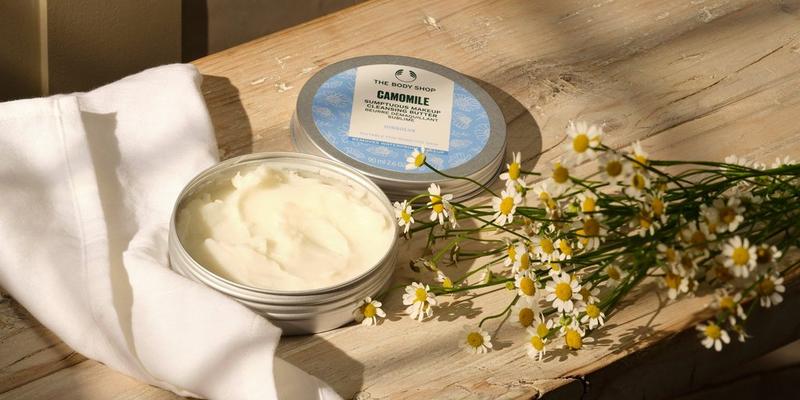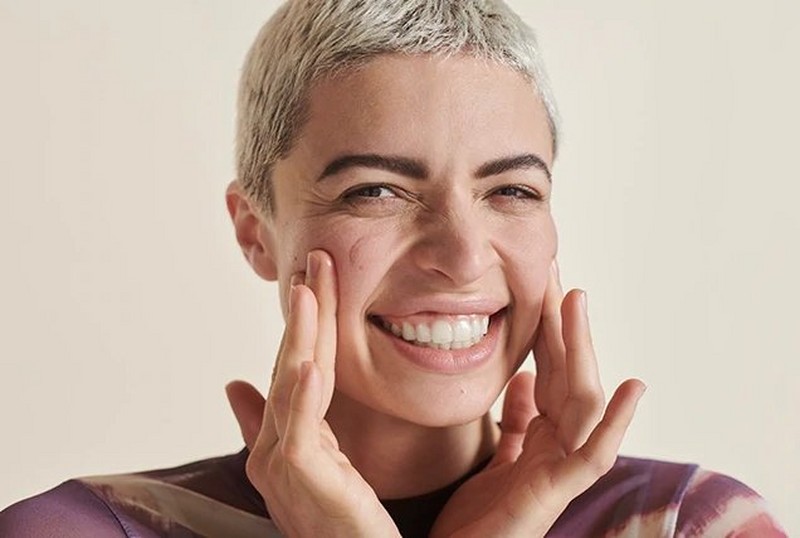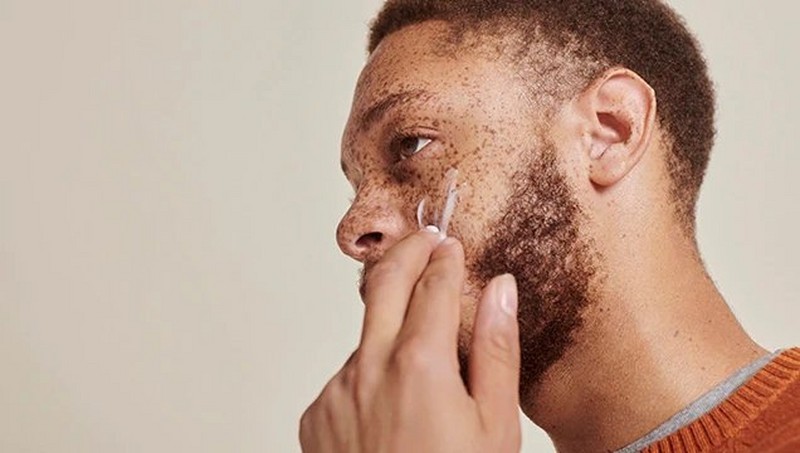HOW TO TREAT DRY SKIN
WHAT ARE THE MAIN CAUSES OF DRY SKIN ON THE FACE AND HOW CAN YOU HELP KEEP IT PROTECTED AND MOISTURISED?
Check out our top dry skin tips and find your perfect routine for dry skin with our caring, soothing and hydrating essentials.
WHAT ARE THE TOP CAUSES OF DRY SKIN?
WEATHER CONDITIONS & UVA/UVB RAYS
Dry skin is more common in colder and drier climates and during the autumn and winter months when humidity levels are relatively lower. During warmer summer months, higher levels of humidity help stop your skin from drying out and losing its moisture.
Humidity and temperature levels indoors can affect your skin’s ability to retain moisture too. When cold, dry air is heated inside it causes the water in your skin to evaporate, which can lead to skin dryness.
It’s also important to keep skin protected from everyday sun damage. UVA rays, including long UVA rays, reach deep into the skin and can accelerate the signs of photoageing, while UVB rays trigger sunburn and damage your skin’s top layers.
DIET & DEHYDRATION
Eating healthy foods can help keep skin hydrated as well as nourished (just like the rest of your body). Flaxseeds, walnuts and fish like salmon high in omega-3 fatty acids, asparagus and avocado rich in vitamin E, sweet potato (eaten with the skin on!) packed with vitamin A and beta-carotene, cucumber high in water and vitamin C, and cooking with olive oil or coconut oil can all benefit your skin.
When your body is dehydrated, it means skin can get dehydrated too, especially when you sweat more during exercise and warm weather. To help keep you and your skin hydrated, try drinking 2L of water every day. Herbal teas are also great for staying refreshed and hydrated.
AGEING & HORMONAL CHANGES
The elderly are more prone to dry skin than younger people. While dry skin tends to affect men and women equally, older people are typically much more prone to dry skin. This is because the skin of older people can have diminished amounts of the natural skin oils and lubricants that help protect skin and retain its moisture.
Hormonal changes can also affect the condition of our skin, especially during the menopause. As we age, the body produces fewer hormones like estrogen. These reproductive hormones stimulate oil glands in the body, so when our production of natural oils is lower, it can cause skin to become dry and itchy. A healthy diet (see above), sufficient sleep and exercise can all help to restore these hormonal imbalances.
HARSH SOAPS & VERY HOT WATER
Harsh facial cleansers made with fragranced oils and chemicals can cause skin to dry out. Swap your soap for our Aloe Calming Foaming Wash or Drops of Youth™ Gentle Foaming Wash. Both lathering cleaners are formulated for sensitive skin.
Taking too many baths and showers or washing with very hot water can also raise the risk of developing dry skin. To avoid this, try turning down the heat or cutting down your shower time to one epic song each day – your skin will love you for it and so will the planet for saving water and energy!
HOW TO TREAT DRY SKIN
WHAT ARE THE BEST INGREDIENTS FOR DRY SKIN?

HEMP
Our Hemp range has been vigorously hydrating skin for over two decades. Hemp seed oil is known to help restore the skin’s barrier and lock in moisture.

COCONUT
Dry skin driving you nuts? Opt for Coconut. Enriched with coconut oil or extracts, our range will leave skin feeling softer and smelling sweeter.

SHEA
Shea Butter is also known for its intensely nourishing effect. Help cocoon yourself in moisture and slather on Shea after (or during) a shower.

CAMOMILE
And because dry skin loves a softly-softly approach, wash away your day with our gentle Camomile range.
DAY TIME ROUTINE FOR DRY SKIN

CLEANSE
Cleanse away grime after a good night’s sleep with our Camomile Sumptuous Cleansing Butter. With a soft, buttery texture it’s easy to use, making it a great option for those with irritating dry patches. Is your face looking for a bit more moisture?

TONE
Tone dry skin with our hydrating Vitamin E Hydrating Toner. Enriched with vitamin E and moisturising wheatgerm a quick swipe will leave skin feeling clean, supple, hydrated and ready for your next round of moisturiser. Use as part of your everyday routine to really see results.

MOISTURISE
While a healthy dose of daily H20 will help keep skin hydrated, a good moisturiser will really give dry skin a drink. Our Vitamin E Intense Moisture Cream is made for dry skin. Made with Community Fair Trade shea butter from Ghana, this stuff will help leave skin feeling silky smooth.

LIP CARE
Let’s not forget your lips! Windy weather and central heating can make lips feel dry and a bit unhealthy. All it takes is a single swipe of this softening Hemp Lip Rescue Stick and dry lips are left feeling intensely nourished and protected with heavy-duty hydration.
THE DRY SKIN ROUTINE
STEP ONE: REMOVE MAKE-UP
To easily remove make-up and leave skin feeling soft and cleansed, massage our Camomile Silky Cleansing Oil into dry skin, add water to emulsify, and then rinse. Enriched with camomile extract from Norfolk, this refreshing and nourishing, all-in-one formula is suitable for sensitive skin.
STEP TWO: TONE
Remove any traces of make-up and cleansers and prep skin for moisturising with our Vitamin E Hydrating Toner. It leaves all skin types (including dry skin) feeling cleansed, supple and hydrated and helps your skin absorb the follow up products in our dry skincare routine.
STEP THREE: TREAT SKIN
First, apply a few drops of our Oils of Life™ Intensely Revitalising Facial Oil onto both palms and gently massage into skin. This lightweight formula is made from 99% ingredients of natural origin and leaves skin feeling revived with radiance and instantly replenished with moisture.
Next, gently massage the skin on your face with our Oils of Life™ Twin-Ball Facial Revitaliser – apply extra pressure where you feel like you need it. This massage helps you relax and unwind while helping you stimulate blood flow and promote lymphatic drainage. This leaves the skin on your face feeling energised and looking radiant.
STEP FOUR: TREAT SKIN AROUND THE EYES
To treat the skin around your eyes, apply Oils of Life™ Intensely Revitalising Eye Cream Gel. It has an airy, smoothing texture that helps dark circles appear faded and makes eye contours look smoother.
Using the Precision Eye Revitaliser, you can smooth on this gel cream formula with the spatula end and then gently massage the skin around your eyes with the rollerball end. This massage helps improve circulation and leaves skin around the eyes feeling refreshed.
STEP FIVE: MOISTURISE ALL DAY
To protect your skin in the day, help restore its natural moisture barrier and lock in up to 72 hours of hydration, apply a dollop of our richly textured, non-greasy Vitamin E Intense Moisture Cream. It’s perfect for dry skin and leaves all skin types feeling fresh and silky soft.
STEP SIX: MOISTURISE OVERNIGHT
To help replenish and recharge skin with moisture at night, you can also apply a few drops of our lightweight, fast-absorbing Vitamin E Overnight Serum-in-Oil. By the time you wake up the next morning, skin feels fresher and looks rested.
STEP SEVEN: MASK
2-3 times a week, treat skin to our gel cream Vitamin E Sink-In Moisture Sleeping Mask. Enriched with Community Trade soya oil from Brazil, it gives skin types an intense moisture boost. Leave on for 10 minutes and wipe away excess with a damp cloth or leave on overnight for a more intensive moisturising treatment.
NIGHT TIME ROUTINE FOR DRY SKIN
As tempting as it is to just roll into bed after a long day, the beauty gurus are right – cleansing and moisturising your skin will help things feel better in the morning. Night time is when skin regenerates and repairs itself. Give it a helping hand with a solid skin recovery routine.
BODY CARE FOR DRY SKIN
When dry skin season descends, give skin some extra TLC with a hydrating body moisturiser. Keep things simple with an uncomplicated routine you can rely on.
STEP ONE: EXFOLIATE DRY SKIN
After cleansing, gently buff away dead skin and leave dry skin feeling refined and smoother with our lightly textured Shea Exfoliating Cream Scrub. For dry, sensitive skin, use our Almond Milk & Honey Gently Exfoliating Cream Scrub.
STEP TWO: CLEANSE DRY SKIN
Lather up with our Almond Milk & Honey Soothing & Caring Shower Cream, Shea Shower Cream or Coconut Shower Cream. These gently cleansing formulas leave dry skin feeling softer and refreshed.
STEP THREE: MOISTURISE DRY SKIN
Moisturise dry, sensitive skin all over your body with a dollop of creamy Almond Milk & Honey Body Lotion. For dry skin, try our Shea Body Lotion, which is now made with three times as much Community Fair Trade shea butter. Find your perfect Body Butter for dry skin below.
To intensely nourish dry skin on your face, body and lips, apply our multi-purpose Shea Butter. It’s packed with the butter of 192 shea nuts.
STEP FOUR: MOISTURISE DRY HANDS
Keep hard-grating hands feeling soft, smooth and protected with our hydrating Hemp Hand Protector or Shea Hand Cream. For dry, sensitive skin, use Almond Milk & Honey Hand Cream. Our hand creams are lightweight and non-greasy so you can just smooth them on and rub your hands together whenever you feel like they need some quick hydration.
STEP FIVE: PROTECT DRY LIPS
To help keep dry lips protected, smooth on our nourishing, multi-purpose Shea Butter.
“Apply the Shea Butter onto your lips and massage in using circular motions. Repeat when needed. It’s perfect for dry skin.”
“You can also exfoliate your lips by mixing one teaspoon of sugar with one teaspoon of Shea Butter until it becomes a paste. Again, gently exfoliate the lips and lip line. When you’ve finished exfoliating, apply pure Shea Butter all over lips.”
Vanda Serrador, Facial & Body Care Expert for The Body Shop.




















